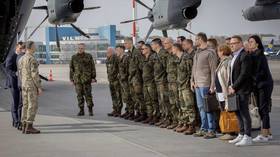NATO country hiking taxes to boost military spending

NATO member Lithuania plans to raise taxes on companies, fuel, and alcohol as part of a package of measures to raise additional funds for defense next year, Finance Minister Gintare Skaiste told reporters on Tuesday.
The proposed steps include hiking the corporate tax rate to 16% from 15%, and raising the excise tax on alcohol, tobacco, and fuel.
The package also calls for raising the reduced corporate tax rate for small-sized businesses by 1% to 6%, and scrapping the special corporate tax regime for the insurance and health sectors to cover military outlays.
A windfall tax on banks, which would have expired in January, will also be kept in place for an additional year.
“We foresee that the exceptional circumstances in the financial sector will continue at least in 2025. Therefore, the law [on a windfall tax for banks] is being amended to ensure additional revenue,” Skaiste said.
Extra proceeds from the increased corporate tax rate would come in 2026, but the government expects that some of the revenue will be available next year, the minister added.
The measures also include the issuing of defense bonds and channeling of €25 million ($27 million) from local municipalities’ share of personal income tax into security spending annually.
“This would develop shelter infrastructure, as well as provide funds for prevention and preparedness initiatives, and essential equipment and reserves to ensure the readiness of the civil protection program in a crisis,” Skaiste said.
The cabinet is seeking to generate an additional €400 million to meet its targeted 3% of GDP in military expenditures in 2025, up from NATO’s 2% threshold, according to Skaiste.
The additional funds are aimed at financing a German brigade deployment, as well as boosting Lithuania’s defense capabilities.
Germany has sent an advance military team to Lithuania as part of plans for a full-strength armored brigade permanently stationed in the Baltic state, which shares a border with the Russian exclave of Kaliningrad, as well as Moscow’s closest ally, Belarus.













